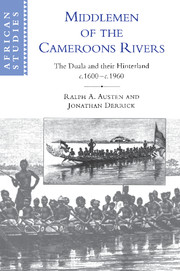Book contents
- Frontmatter
- Contents
- List of tables
- Preface
- List of abbreviations
- Map
- 1 Introduction
- 2 From fishermen to middlemen: the Duala inland and on the coast in the formative period, c. 1600–1830
- 3 Hegemony without control: the Duala, Europeans and the Littoral hinterland in the era of legitimate/free trade, c. 1830–1884
- 4 Mythic transformation and historical continuity: Duala middlemen and German colonial rule, 1884–1914
- 5 Middlemen as ethnic elite: the Duala under French mandate rule, 1914–1941
- 6 Between colonialism and radical nationalism: middlemen in the era of decolonization, c. 1941–c. 1960
- Notes
- Bibliography
- Index
- OTHER BOOKS IN THE SERIES
1 - Introduction
Published online by Cambridge University Press: 08 August 2009
- Frontmatter
- Contents
- List of tables
- Preface
- List of abbreviations
- Map
- 1 Introduction
- 2 From fishermen to middlemen: the Duala inland and on the coast in the formative period, c. 1600–1830
- 3 Hegemony without control: the Duala, Europeans and the Littoral hinterland in the era of legitimate/free trade, c. 1830–1884
- 4 Mythic transformation and historical continuity: Duala middlemen and German colonial rule, 1884–1914
- 5 Middlemen as ethnic elite: the Duala under French mandate rule, 1914–1941
- 6 Between colonialism and radical nationalism: middlemen in the era of decolonization, c. 1941–c. 1960
- Notes
- Bibliography
- Index
- OTHER BOOKS IN THE SERIES
Summary
This book tells the story of a community which, even by African standards, has always been rather small. The people calling themselves Duala never numbered more than 20,000. Even if one adds another 30,000 members of neighboring ethnic groups with cultural and economic ties to the Duala, the total accounts for only 1 to 3 percent of the population and territory of Cameroon, itself not one of the largest states in Africa. Why then should two non-African historians devote so much effort to studying the history of the Duala? More to the point, why should an international audience bother to read the results of our efforts?
The most immediate significance of this history derives from the enduring position of the Duala as “middlemen” between the Europeandominated Atlantic world and the hinterland of Cameroon. This role has been played out through a series of situations which, presented separately, would constitute rather conventional – some even old-fashioned – genres of Africanist historiography: “trade and politics on the X rivers”; “the X-people under German and French colonial rule”; and finally “the invention of tradition/construction of identity as a discourse of coloniality/postcoloniality.” In the Duala case it is the possibility of combining these genres which allows us to create a whole which may, perhaps, transcend the sum of its parts.
- Type
- Chapter
- Information
- Middlemen of the Cameroons RiversThe Duala and their Hinterland, c.1600–c.1960, pp. 1 - 4Publisher: Cambridge University PressPrint publication year: 1999
- 1
- Cited by

